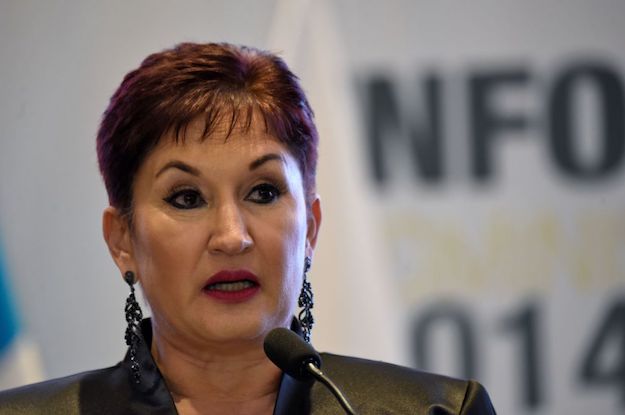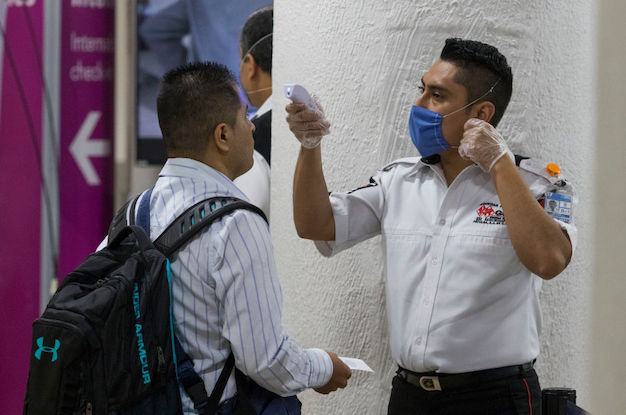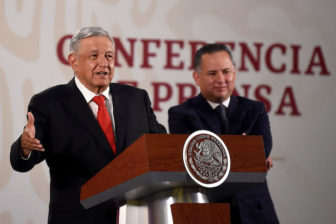When Thelma Aldana finished her term as Guatemala’s Attorney General last May, she left office as the most popular public official in the country, according to private polling. That reputation was a direct result of her leading role in Guatemala’s fight against corruption, including the prosecution and arrest of a sitting president, Otto Pérez Molina, in 2015. With the help of the UN-sponsored International Commission Against Impunity in Guatemala (CICIG), Aldana’s office investigated and prosecuted over 50 corruption cases in the last three years.
The big question is, what’s next for Aldana? At 62, she’s not ready to retire. And with the Guatemalan general elections less than a year away, a source close to her team and with knowledge of her plans told AQ she will run for president. Is Aldana ready to take on the political arena?
In a recent interview with AQ, Aldana declined to confirm she was running, but said she was open to the idea. “I haven’t made up my mind yet. I don’t have money or a political party to run with. If there was an inclusive platform that was open to people from the left and the right, to women, to immigrants, to young people, to indigenous people, to the private sector – a platform that would open spaces that have been occupied by traditional politicians, I think many of us would be interested in running,” she said.
If Aldana were to become president, she would consolidate the fight against corruption with the one big thing it’s missing: policy. CICIG and Guatemala’s chief prosecutor’s office, the Public Ministry (MP), have teamed up to prosecute large-scale organized crime groups. But a meaningful change to the political system will require changes to laws and public policy as well.
Alongside CICIG, the MP under Aldana introduced several reforms to the penal code and the constitution intended to modernize the justice system. Those proposals included specialized procedures to appoint Appeals Court and Supreme Court judges, the recognition of indigenous law, new transparency laws (including ways to regulate public trusts, which are currently beyond the scope of the state auditing authorities), and regulations that would allow the MP to negotiate plea bargains with defendants to expedite justice. But those reforms weren’t taken up. Many of the legislators and political parties in Congress with the power to approve the changes were being prosecuted by Aldana’s office at the time; they did everything in their power to keep those laws from happening.
A president who is committed to the anti-corruption fight might be better placed to find success. But before Aldana can get her name on a ballot, she’ll have to jump through several hoops. There are at least three challenges that could bring her political aspirations to a halt.
First, as she has recognized, Aldana doesn’t have a political party to run with and she is unable to run as an independent candidate per Guatemalan law. “Joining a pre-existing political vehicle is counterproductive because that means she won’t be its true leader, she’ll be seen as an adopted one,” political analyst Renzo Rosal told AQ. Another disadvantage is that running with an established party means joining the vieja política (old political system) that is widely criticized in Guatemala today. As it turns out, the only way to fight the system is to get into the system. And with the first round of presidential elections scheduled for June 2019, there is not enough time for her to build her own platform.
Aldana’s second challenge is that she’s not a politician. She doesn’t talk like one, she has never participated in a rally and she’s never had to be charismatic before a crowd. That just wasn’t her job before. “Aldana can be a great judge and an excellent prosecutor, but that doesn’t necessarily translate into being a great candidate,” said Rosal. “She’ll be taking a giant leap, and that leap could be a jump into the abyss. She’s a novice in the political world.”
Lastly, Aldana’s candidacy would represent a challenge to traditional centers of power – and her list of enemies has grown dramatically in the last few years. Many of the officials her office put in prison have united against the corruption fight. Parts of Guatemala’s more traditional private sector, too, have tried to stop the fight against corruption, saying that it’s bad for business. Some of those incarcerated in a VIP detention center in Guatemala City, including Pérez Molina, have called the MP and CICIG’s work a political witch-hunt. They have hired lobbyists in Washington to try to convince Congress to cut off CICIGs funding. There is little doubt they would go to great lengths to stop Aldana from becoming president.
But Aldana wouldn’t be going it alone. The younger, more progressive business sector is mostly on her side. The urban middle class, advocacy groups, students and the international community all support her. Aldana is not widely known in the countryside (mainly because the MP only has offices in 10 percent of the country) but she is known in several districts where her administration has taken down mayors and congress members who have been accused of corruption.
Guatemala’s political party system is in flux, as electoral authorities have recently dissolved several parties on the grounds of illicit financing, manipulating audit reports and other crimes. But of those left standing, Aldana’s best option could be Encuentro por Guatemala (EG), Rosal said.
EG was founded in 2007 and has had most of its electoral successful in urban areas. The party’s secretary general, Nineth Montenegro, has been a member of Congress for over 20 years and is known for holding power to account. Even then, there would be challenges. EG is small, and most of its members come from urban and suburban counties. The party has also lost some of its past influence in recent years. It does not have a strong national infrastructure that might help Aldana win the election. She and her team would have to do most of the work.
Montenegro said she had no information about Aldana’s potential candidacy, but that it would be great if a woman were to run. Despite Montenegro’s statement, members of Aldana’s team and an EG party member both told AQ that negotiations were already underway.
Guatemala’s political panorama remains uncertain, and only one contender has officially announced his candidacy. But of the pool of those expected to run, there doesn’t appear to be an anti-corruption fighter on the list. Aldana could be the best hope for Guatemala to make sure its gains in the fight against corruption don’t evaporate.
—
Enriquez is a journalist based in New York and an editorial intern for AQ








